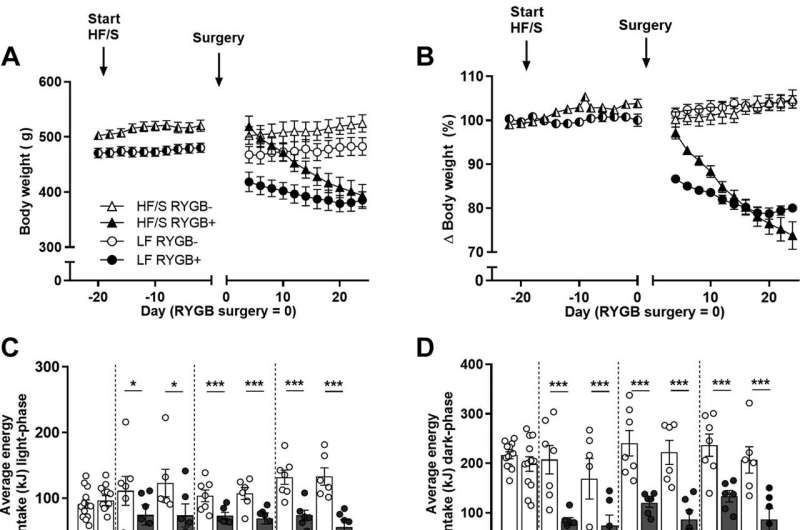This article has been reviewed according to Science X's editorial process and policies. Editors have highlighted the following attributes while ensuring the content's credibility:
fact-checked
trusted source
proofread
Intake reduction and pre-surgery body weight explain efficacy of weight loss surgery, study shows

A new study finds that pre-surgery weight plays a role in how much weight loss occurs after gastric bypass. The study is published ahead of print in the American Journal of Physiology-Regulatory, Integrative and Comparative Physiology.
Bariatric surgery is a successful solution for long-term weight loss for many people with severe obesity, and it subsequently reduces the development of chronic conditions such as Type 2 diabetes and heart disease. Roux-en-Y gastric bypass surgery, in which a small pouch is created in the upper stomach to hold food and is rerouted to a lower part of the small intestine, is considered the "gold standard" of weight loss surgery.
However, the processes of how and why significant weight loss occurs after Roux-en-Y are not clear. Factors can include eating less, losing the taste for sugary, high-carbohydrate and high-fat foods and physical activity levels after the procedure.
To determine what factors work together—or not—to promote weight loss after surgery, researchers assigned different diets to two groups of rats about a month before undergoing the procedure. Some of the rats ate a Western-style diet high in fat and sugar while others followed a more standard rodent diet that is low in fat and high in fiber. The animals following the high fat-high sugar diet weighed significantly more than their low-fat diet counterparts before the trial began.
After the surgery, the rats continued their respective diets. The researchers measured how much food the animals ate, activity patterns and fluctuations in body temperature. After 24 days, the research team analyzed fat tissue samples from all the animals.
All the rats lost weight after the procedure. However, the Western-style group ultimately lost more body weight and fat tissue by the end of the trial, reaching similar levels as those feeding the low-fat diet. The rats that followed the Western-style diet ate less after surgery, and they appeared to tolerate the surgery better compared to the low-fat feeding rats (based on body temperature and locomotor patterns).
The authors acknowledge that a high-fat, high-sugar diet is not rats' typical dietary preference. They can't definitively say how much of a role this played in the reduced appetite, but reduced appetite probably did not result from increased surgery-induced malaise. The rats' weight loss occurred not only from changes in eating habits or activity levels, but also because of pre-surgery body composition, the researchers explained.
"The degree of weight loss in a regression model was explained, besides energy intake reduction, also by body weight just before [Roux-en-Y], and this relation was not influenced by factors related to locomotor activity," the authors wrote.
"Unraveling the neurobiological mechanisms by which stored fat and/or diet type independently or in combination exert these effects may be of clinical importance and deserves further investigation."
More information: C. Warner Hoornenborg et al, Weight loss in adult male Wistar rats by Roux-en-Y gastric bypass is primarily explained by caloric intake reduction and presurgery body weight, American Journal of Physiology-Regulatory, Integrative and Comparative Physiology (2024). DOI: 10.1152/ajpregu.00169.2023




















